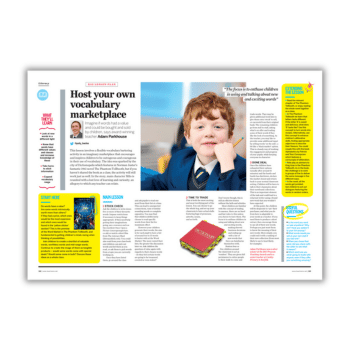Imagine if words had a value and children could buy or sell them. This KS2 vocabulary lesson plan from award-winning teacher Adam Parkhouse involves a flexible vocabulary bartering activity in an imaginary marketplace.
The activity encourages and inspires children to be outrageous and courageous in their use of vocabulary.
The idea was sparked by the city of Dictionopolis. This features in Norman Juster’s fantastic 1961 novel The Phantom Tollbooth. If you haven’t shared the book as a class, this activity will still work just as well.
In the story, main character Milo reunites with a lost love of learning and curiosity, an allegory to which any teacher can relate.
KS2 vocabulary learning objectives
- Look at new words in a different light
- Know that words have different values and classes and increase knowledge of these
- Take turns to elicit information
- Expand vocabulary range
Starter activity
Do words have a value? Are some words intrinsically worth more than others? If they had a price, which ones would be the most expensive and which ones would be found in the ‘yellow sticker’ section?
This is the premise of the Word Market in The Phantom Tollbooth, and fundamental to getting children’s minds racing when thinking of possibilities.
Ask children to create a shortlist of valuable words, worthless words and mid-range words. Continue to create the image of them as tangible products – would some words come with special deals? Would some come in bulk? Discuss these ideas as a whole class.
Adam Parkhouse was a silver winner at the 2017 Pearson Teaching Awards and is a senior teacher at Cantley Primary in Norfolk. Browse more ambitious vocabulary resources.














